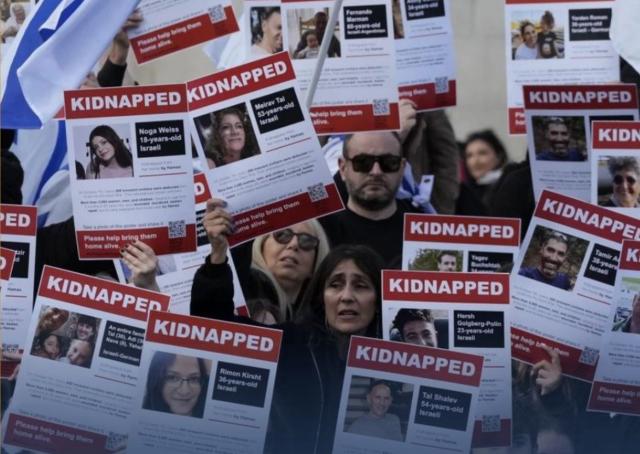Earleier it was reported that Egyptian authorities have confirmed receiving a preliminary list of 10 hostages, marking the first phase of a significant exchange deal involving the release of 50 individuals held in Gaza. This exchange is proposed in return for 150 Palestinian prisoners and a ceasefire agreement. Israeli authorities have pushed back on that report, stating that it is incorrect and that Egypt is not in posession of the list.
Initially set to commence on Thursday, the execution of the deal faced delays due to incomplete information from Hamas regarding the first group of hostages. These developments come as Hamas introduces new conditions to the already postponed hostage/truce agreement, with specifics yet to be disclosed.
💥BBC cites "Israeli government source," saying Hamas has made "additional demands… though it’s not clear what those demands are." The @WSJ says Hamas is refusing to allow the Red Cross to visit hostages remaining in captivity. Qatar promises an imminent update. pic.twitter.com/C7eyTMXGkv
— Noga Tarnopolsky נגה טרנופולסקי نوغا ترنوبولسكي💙 (@NTarnopolsky) November 23, 2023
According to a report by the BBC, citing an anonymous Israeli government source, the nature of these additional Hamas demands remains unclear although there are reports that one of the demands is that the transfer happens through Egypt, bypassing the International Red Cross. What this means, considering one of Israel's demands that was agreed upon from the start is that the ICRC be given access to the hostages in Gaza for treatment, medications and wellness checks.
The initial agreement, as per Hamas's announcement, was slated for implementation at 10 AM today. However, Israel signaled late last night that the process would not begin until at least Friday, leading to intensified diplomatic efforts.
Negotiators, including representatives from Qatar, Egypt, Israel, and the U.S., are working vigorously to resolve the final details. The agreement aims to secure the release of Israeli hostages held by Hamas and achieve a temporary cessation of hostilities. The first transfer of hostages is now expected no earlier than Friday, according to Israeli and regional officials.
💥BBC cites "Israeli government source," saying Hamas has made "additional demands… though it’s not clear what those demands are." The @WSJ says Hamas is refusing to allow the Red Cross to visit hostages remaining in captivity. Qatar promises an imminent update. pic.twitter.com/C7eyTMXGkv
— Noga Tarnopolsky נגה טרנופולסקי نوغا ترنوبولسكي💙 (@NTarnopolsky) November 23, 2023
Senior Egyptian officials attribute this delay to Hamas's failure to provide a comprehensive list of the first group of hostages slated for release. Amidst these diplomatic efforts, Israel continues its military operations in Gaza, targeting numerous locations across the region.
This last-minute hiccup underscores the delicate nature of the peace process, a significant diplomatic venture in the ongoing seven-week conflict between Israel and Hamas. Despite the challenges, negotiators remain optimistic, though the path to a successful handover is fraught with complications.
Hamas to reportedly transfer to Israel list of 12-15 names of hostages to be released, most likely via Egypthttps://t.co/NXBgsOX6c5 #ILHWarBlog #Israel #IsraelUnderAttack #Hamas #HamasisISIS #StandWithIsrael #FreeGazaFromHamas #HamasTerrorrists #IraniansStandWithIsrael…
— Israel Hayom English (@IsraelHayomEng) November 23, 2023
As previously reported in The Judean, difficulties partly arise from Hamas's struggle to locate all hostages, raising questions about their safety and status.
Furthermore, internal strife within Gaza complicates the situation. Reports of public dissent against Hamas, including protests and an alleged assault on a Hamas officer over control of emergency supplies and humanitarian aid, indicate a shift in the internal power dynamics.
The agreement, broadly speaking, entails a four-day truce in Gaza and the phased release of 50 hostages by Hamas in exchange for 150 Palestinian prisoners, predominantly women and children, from Israeli detention. The plan allows for a potential extension of the ceasefire if further hostage releases occur.
‼️#Hostage deal update
— TomTomski🇳🇱🇮🇱🏛️🚜 (@NldTmv) November 23, 2023
One report says that the delay in the hostage deal is due to Hamas insisting that the freed Israelis be transferred via Egypt, and not directly to Israel via the Red Cross.
Hamas is also said to be refusing Israel's demand that the Red Cross be granted…
Despite agreeing on the overall list of 50 individuals, including their identities and details, Hamas has not yet formalized the mechanism for their release nor provided Israel with a specific list of the initial group to be freed. This lack of clarity and formal agreement is a critical sticking point in advancing the deal.
Senior officials emphasize the urgency and importance of resolving these issues to facilitate the agreement's implementation, expected to take effect by Friday. The situation remains fluid, with all parties engaged in high-stakes negotiations to ensure the safe return of hostages and a temporary reprieve from the conflict.


